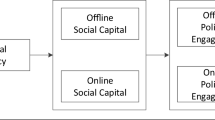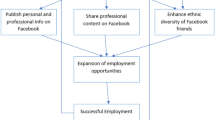Abstract
This research study was designed to examine manifestation of online and offline political participation of educated Pakistani youth. The second objective of the study was to locate variation in political participation of the students on the basis of sociodemographic variables and the membership of Facebook pages of the users. The population of the study was university students studying in various degree awarding institutes of Lahore city, capital city of the Punjab province. The data were collected through structured questionnaire from 1245 students of various university students. Factor analysis was performed to see the manifestation of both kinds of political participation. Independent sample t-test and one way ANOVA were used to see differences in political participation of the students based on their sociodemographic variables and membership of Facebook pages. The findings confirmed that university students practiced both kinds of political participation. However, they were more inclined towards online political participation than offline political participation. The results also approved that sociodemographic variables and the membership of Facebook pages had significant effect on online and offline political participation of the students.
Similar content being viewed by others
References
Ahmad, K., & Sheikh, K. S. (2013). Social media and youth participatory politics: a study of University Students. Southeast Asian Studies, 28(2), 353.
Attia, A. M., Aziz, N., Friedman, B., & Elhusseiny, M. F. (2011). Commentary: the impact of social networking tools on political change in Egypt’s “Revolution 2.0”. Electronic Commerce Research and Applications, 10(4), 369–374.
Aurangzeb, B. (2008). Youth in governance: exploring dynamics of youth participation in Pakistan. The Hague: Institute of Social Studies.
Barber, B. (1984). Strong democracy: Participatory democracy for a new age. Berkley & Los Angeles: University of California Press.
Best, S. J., & Krueger, B. S. (2005). Analyzing the representativeness of internet political participation. Political Behavior, 27(2), 183–216.
Bimber, B. (2001). Information and political engagement in America: the search for effects of information technology at the individual level. Political Research Quarterly, 54(1), 53–67.
Bimber, B. (2003). Information and American democracy: Technology in the evolution of political power. Cambridge: Cambridge University Press.
Boogers, M., & Voerman, G. (2003). Surfing citizens and floating voters: Results of an onlinesurvey of visitors to political web sites during the Dutch 2002 General Elections. Information Polity, 8(1, 2), 17–27.
Castells, M. (2013). Communication power. Oxford: OUP Oxford.
Centre of Civic Education Pakistan. (2009). Political participation of youth in Pakistan. Islamabad: CCE and NDI
Chambers, S. (2003). Deliberative democratic theory. Annual Review of Political Science, 6(1), 307–326.
Cogburn, D. L., & Espinoza-Vasquez, F. K. (2011). From networked nominee to networked nation: Examining the impact of Web 2.0 and social media on political participation and civic engagement in the 2008 Obama campaign. Journal of Political Marketing, 10(1–2), 189–213.
Crompton, J., (2008). Mixing friends with politics: A functional analysis of ‘08 presidential candidates social networking profiles. In: Paper Presented at the Annual Meeting of the National Communication Association 94th Annual Convention. San Diego, California.
Dahl, R. A. (1989). Democracy and its critics. New Haven: Yale University Press.
Edgerly, S., Vraga, E. K., Bode, L., Thorson, K., & Thorson, E. (2017). New media, new relationship to participation? A closer look at youth news repertoires and political participation. Journalism & Mass Communication Quarterly, 95(1), 192–212.
Eijaz, A. (2013). Impact of New Media on Dynamics of Pakistan Politics. Journal of Political Studies, 20(1), 113–130.
Fernandes, J., Giurcanu, M., Bowers, K. W., & Neely, J. C. (2010). The writing on the wall: A content analysis of college students' Facebook groups for the 2008 presidential election. Mass Communication and Society, 13(5), 653–675.
Gil de Zúñiga, H., Veenstra, A., Vraga, E., & Shah, D. (2010). Digital democracy: Reimagining pathways to political participation. Journal of Information Technology & Politics, 7(1), 36–51.
Gueorguieva, V. (2008). Voters, Myspace, and Youtube the impact of alternative communication channels on the 2006 election cycle and beyond. Social Science Computer Review, 26(3), 288–300.
Haq, A., & Chand, S. (2012). Pattern of Facebook usage and its impact on academic performance of university students: a gender based comparison. Bulletin of Education and Research, 34(2), 19–28.
Harris, A., Wyn, J., & Younes, S. (2010). Beyond apathetic or activist youth: “Ordinary” young people and contemporary forms of participation. Young, 18(1), 9–32.
Hussain. (2007). Over 70 percent Pakistani youth indifferent to politics. Retrieved from http://www.nowpublic.com/politics/over-70-cent-pakistani-youth-indifferent-politics.
Iqbal, S. (2012). Exploring political attitude among educated youth: A study at university of Sargodha. Academic Research International, 3(3), 375.
Javaid, U. (2017). Predictors of online political participation among youth in Pakistan. The Anthropologist, 28(1–2), 41–51.
Kahne, J., & Bowyer, B. (2018). The political significance of social media activity and social networks. Political Communication, 1–24.
Karagiannopoulos, V. (2012). The role of the internet in political struggles: Some conclusions from Iran and Egypt. New Political Science, 34(2), 151–171.
Kim, Y., Russo, S., & Amnå, E. (2017). The longitudinal relation between online and offline political participation among youth at two different developmental stages. New Media & Society, 19(6), 899–917.
Kushin, M. J., & Yamamoto, M. (2010). Did social media really matter? College students' use of online media and political decision making in the 2008 election. Mass Communication and Society, 13(5), 608–630.
Mahmood, Q.K. (2014). Use of Facebook as a source of political participation among university students of Pakistan. XVIII ISA World Congress of Sociology (July 13–19, 2014).
Metzgar, E., & Maruggi, A. (2009). Social media and the 2008 US presidential election. Journal of New Communications Research, 4(1).
Norris, P. (2001). Digital divide? Civic engagement, information poverty and the internet worldwide. Cambridge: Cambridge University Press.
PAS (2017). Digital in 2017: Global overview. Retrieved from http://www.pas.org.pk/digital-in-2017-global-overview/
Putnam, R. (2000). Bowling alone. NY: Simon and Schuster.
Quintelier, E., & Vissers, S. (2008). The effect of internet use on political participation: An analysis of survey results for 16-year-olds in Belgium. Social Science Computer Review, 26(4), 411–427.
Qureshi, U. (2016). TECHJUICE. Retrieved 1 May, 2016, from http://www.techjuice.pk/pakistan-facebook-users-crosses-the-landmark-of-20-millionusers/.
Rainie, L., Smith, A., Schlozman, K. L., Brady, H., & Verba, S. (2012). Social media and political engagement. Pew Internet & American Life Project, 19.
Rheingold, H. (2008). Using participatory media and public voice to encourage civic engagement. Civic life online: Learning how digital media can engage youth, 97–118.
Sadow, J. D., & James, K. (1999). Virtual billboards? Candidate web sites and campaigning in 1998. In Annual Meeting of the American Political Science Association (APSA), Atlanta, GA, August.
Sarfaraz, A., Ahmed, S., Khalid, A., & Ajmal, M. A. (2012). Reasons for political interest and apathy among university students: A qualitative study. Pakistan Journal of Social and Clinical Psychology, 10(1), 61–67.
Schlozman, K. L., Verba, S., & Brady, H. E. (2010). Weapon of the strong? Participatory inequality and the internet. Perspectives on Politics, 8(2), 487–509.
Shah, D. V., Kwak, N., & Holbert, R. L. (2001). Connecting and disconnecting with civic life: Patterns ofInternet use and the production of social capital. Political Communication, 18, 141–162.
Shaheen, M. A. (2008). Use of social networks and information seeking behavior of studentsduring political crises in Pakistan: a case study. The International Information & Libraryreview, 40(3), 142–147.
Smith, A. (2009). The internet's role in campaign 2008. Retrieved from Pew Internet & American Life Project website: http://pewinternet.org/~/media//Files/Reports/2009/The_Internets_Role_in_Campaign_2008.pdf.
Strandberg, K. (2006). Parties, candidates and citizens on-line: Studies of politics on the Internet. Abo: Abo Akademi University Press.
Stromer-Galley, J. (2002). New voices in the public sphere: a comparative analysis of interpersonal and online political talk. Javnost-the Public, 9(2), 23–41.
Tolbert, C. J., & McNeal, R. S. (2003). Unraveling the effects of the internet on political participation. Political Research Quarterly, 56(2), 175–185.
Valenzuela, S., Correa, T., & Gil de Zúñiga, H. (2018). Ties, likes, and tweets: Using strong and weak ties to explain differences in protest participation across Facebook and Twitter use. Political Communication, 35(1), 117–134.
Van Dijk, J. (2005). The deepening divide. Thousand Oaks: Sage.
Van Dijk, T. A. (2013). News as discourse. New York: Routledge.
Van Wyngarden, K. E. (2012). New participation, new perspectives? Young adults' political engagement using Facebook (Doctoral dissertation, Colorado State University).
Verba, S., Schlozman, K. L., & Brady, H. E. (1995). Voice and equality: Civic voluntarism in American politics. Cambridge: Harvard University Press.
Vitak, J., Zube, P., Smock, A., Carr, C. T., Ellison, N., & Lampe, C. (2011). It's complicated: Facebook users' political participation in the 2008 election. Cyber Psychology, Behavior, and Social Networking, 14(3), 107–114.
Wellman, B. (1997). An electric group is virtually a social network. In S. Kiesler (Ed.), The culture of the internet. Hillsdale: Lawrence Erlbaum.
Wellman, B., Hasse, A. Q., Witte, J., & Hampton, K. (2002). Capitalizing on the internet: Networkcapital, participatory capital and sense of community. In B. Wellman & C. Haythornthwaite (Eds.), The internet in everyday life. Oxford: Blackwell.
Zahra, N. (2013). Implications of demographic antecedents in determining the motivational drives among women entrepreneurs: a case study of women entrepreneurs venturing in Lahore, Pakistan. Asian Journal of Business management, 5(1), 163–173.
Zukin, C., Keeter, S., Andolina, M., Jenkins, K., & Delli Carpini, M. X. (2006). A new engagement? Political participation, civic life, and the changing American citizen. NY: Oxford University Press.
Acknowledgements
The current study was a part of doctoral research project submitted by the first author in Institute of Social and Cultural Studies (ISCS), PU, Lahore for the award of PhD degree in Sociology.
Author information
Authors and Affiliations
Corresponding author
Rights and permissions
About this article
Cite this article
Mahmood, Q.K., Bhutta, M.H. & Haq, M.A.u. Effects of sociodemographic variables and Facebook group membership on students political participation. Educ Inf Technol 23, 2235–2247 (2018). https://doi.org/10.1007/s10639-018-9715-5
Received:
Accepted:
Published:
Issue Date:
DOI: https://doi.org/10.1007/s10639-018-9715-5




